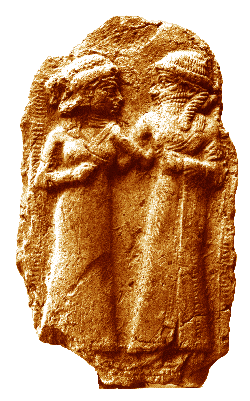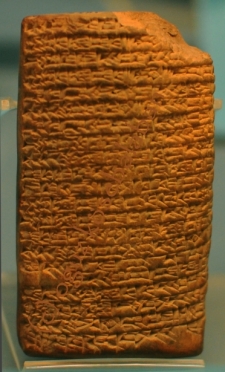

-
~Music ~ Indus by Dead can Dance
Love has been celebrated in song, dance and literature since humans set foot on Earth, but because nothing was put in writing for a while, the world’s oldest love poem only dates back to 2025 BC.
The poem is the celebration of a ritual that took place each Mesopotamian new year, an event that took place around the Spring Equinox. The 29 lines are written in Sumerian and celebrate the sacred marriage between the Sumerian king and the Sumerian goddess of love and war, Inanna.
According to the Sumerian belief, it was a sacred duty for the king to marry every year a priestess instead of Inanna, the goddess of fertility and sexual love, in order to make the soil and women fertile. This poem was most probably written by a bride chosen for Shu-Sin in order to be sung at the New Year festival and it was sung at banquets and festivals accompanied by music and dance.
Scholars say, this was a ritual taking place in Mesopotamian festivals for fertility and power which also included the initiation of a sacred Marriage. The new year for the Sumerians is around the spring equinox, and every new year the Sumerian king “married” the Sumerian goddess of love and war, namely Inanna. Inanna is the Babylonian version of Ishtar. Inanna’s powers included renewing the land’s fertility.
Every summer at the special festival Inanna’s high priestess of Inanna representing Inanna married the King: The King would provide offerings; and the priestess would accept the king into her bed, preceded by an invitational love poem: In the one below Sumerian king is Shu-Sin, and we are introduced to Enlil, the high priestess.
The oldest surviving love poem is written in a clay tablet from the times of the Sumerians, and was called by archaeologists by a very un-romantic name: ‘Istanbul #2461′. The author is unknown but is believed to have been recited by a bride of Sumerian King Shu-Sin (2037-2029 BC), the fourth ruler of the Third Dynasty of Ur (“3rd” because it is the third time that Ur is listed in the Sumerian king list). It currently has its home at the İstanbul Archaeological Museums.
The following translation of The Love Song of Shu-Sin is from Samuel Noah Kramer’s work History Begins at Sumer, pp 246-247:
Bridegroom, dear to my heart,
Goodly is your beauty, honeysweet,
Lion, dear to my heart,
Goodly is your beauty, honeysweet.
You have captivated me, let me stand tremblingly before you.
Bridegroom, I would be taken by you to the bedchamber,
You have captivated me, let me stand tremblingly before you.
Lion, I would be taken by you to the bedchamber.
Bridegroom, let me caress you,
My precious caress is more savory than honey,
In the bedchamber, honey-filled,
Let me enjoy your goodly beauty,
Lion, let me caress you,
My precious caress is more savory than honey.
Bridegroom, you have taken your pleasure of me,
Tell my mother, she will give you delicacies,
My father, he will give you gifts.
Your spirit, I know where to cheer your spirit,
Bridegroom, sleep in our house until dawn,
Your heart, I know where to gladden your heart,
Lion, sleep in our house until dawn.
You, because you love me,
Give me pray of your caresses,
My lord god, my lord protector,
My Shu-Sin, who gladdens Enlil’s heart,
Give my pray of your caresses.
Your place goodly as honey, pray lay your hand on it,
Bring your hand over like a gishban-garment,
Cup your hand over it like a gishban-sikin-garment.
Filed under: Uncategorized